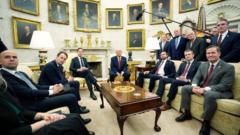A recent leak revealing a military chat group involving Trump officials raises questions about national security and internal disagreements on U.S. military policy towards Europe and Iran.
**Top Takeaways from the Leaked Military Chat Group Involving Trump Administration Officials**

**Top Takeaways from the Leaked Military Chat Group Involving Trump Administration Officials**
New revelations from a leaked Signal group chat highlight internal discussions on military strikes in Yemen.
In a shocking development, a group chat on Signal, reportedly involving senior officials from the Trump administration including Vice-President JD Vance and Defence Secretary Pete Hegseth, has been leaked. The chat, initially joined by journalist Jeffrey Goldberg, focused on military strategies for striking Iranian-backed Houthi forces in Yemen, raising serious concerns about a breach of national security protocols.
Goldberg disclosed that he witnessed classified military plans, including targets and timing, just two hours before the strikes. The leak underscores a chasm within the Trump administration about military strategies, particularly concerning Europe’s role in funding its own defense.
One of the key points raised in the discussions was the concern voiced by Vice-President Vance, who cautioned that striking the Houthi forces primarily benefits European interests, given their trade reliance on the Suez Canal. He expressed worries that the attack could result in a spike in oil prices. Vance’s apprehensions highlighted a significant divide on how U.S. military actions could appear inconsistent with Trump's recent criticism of European NATO allies and their defense spending.
Amid the discussion of military action, comments reflected a mutual disdain for what was described as European 'free-loading.' Vance's sentiments were echoed by Hegseth, who expressed frustration over U.S. military funds often being perceived as aiding European security. The chat members proposed conditional support from Europe in return for U.S. military efforts.
Following the air strikes, reactions within the group included celebratory emojis and expressions of support, but Vance remained cautious about how these actions would be perceived externally, particularly against the backdrop of the Trump administration's narrative blaming President Biden for his dealings with Iran.
The leak, which has provoked significant criticism and calls for inquiry by Democratic lawmakers, puts national security adviser Mike Waltz on the hot seat as he tries to manage both the fallout and Trump's public statements, which claimed ignorance about the details of the chat. Hegseth downplayed the severity of the leak, asserting that no secrets were divulged.
This incident illustrates the complexity of U.S. foreign military engagements and the intricate relationship within the administration on how to approach traditional alliances, defense responsibilities, and responding to perceived threats abroad.
Goldberg disclosed that he witnessed classified military plans, including targets and timing, just two hours before the strikes. The leak underscores a chasm within the Trump administration about military strategies, particularly concerning Europe’s role in funding its own defense.
One of the key points raised in the discussions was the concern voiced by Vice-President Vance, who cautioned that striking the Houthi forces primarily benefits European interests, given their trade reliance on the Suez Canal. He expressed worries that the attack could result in a spike in oil prices. Vance’s apprehensions highlighted a significant divide on how U.S. military actions could appear inconsistent with Trump's recent criticism of European NATO allies and their defense spending.
Amid the discussion of military action, comments reflected a mutual disdain for what was described as European 'free-loading.' Vance's sentiments were echoed by Hegseth, who expressed frustration over U.S. military funds often being perceived as aiding European security. The chat members proposed conditional support from Europe in return for U.S. military efforts.
Following the air strikes, reactions within the group included celebratory emojis and expressions of support, but Vance remained cautious about how these actions would be perceived externally, particularly against the backdrop of the Trump administration's narrative blaming President Biden for his dealings with Iran.
The leak, which has provoked significant criticism and calls for inquiry by Democratic lawmakers, puts national security adviser Mike Waltz on the hot seat as he tries to manage both the fallout and Trump's public statements, which claimed ignorance about the details of the chat. Hegseth downplayed the severity of the leak, asserting that no secrets were divulged.
This incident illustrates the complexity of U.S. foreign military engagements and the intricate relationship within the administration on how to approach traditional alliances, defense responsibilities, and responding to perceived threats abroad.




















